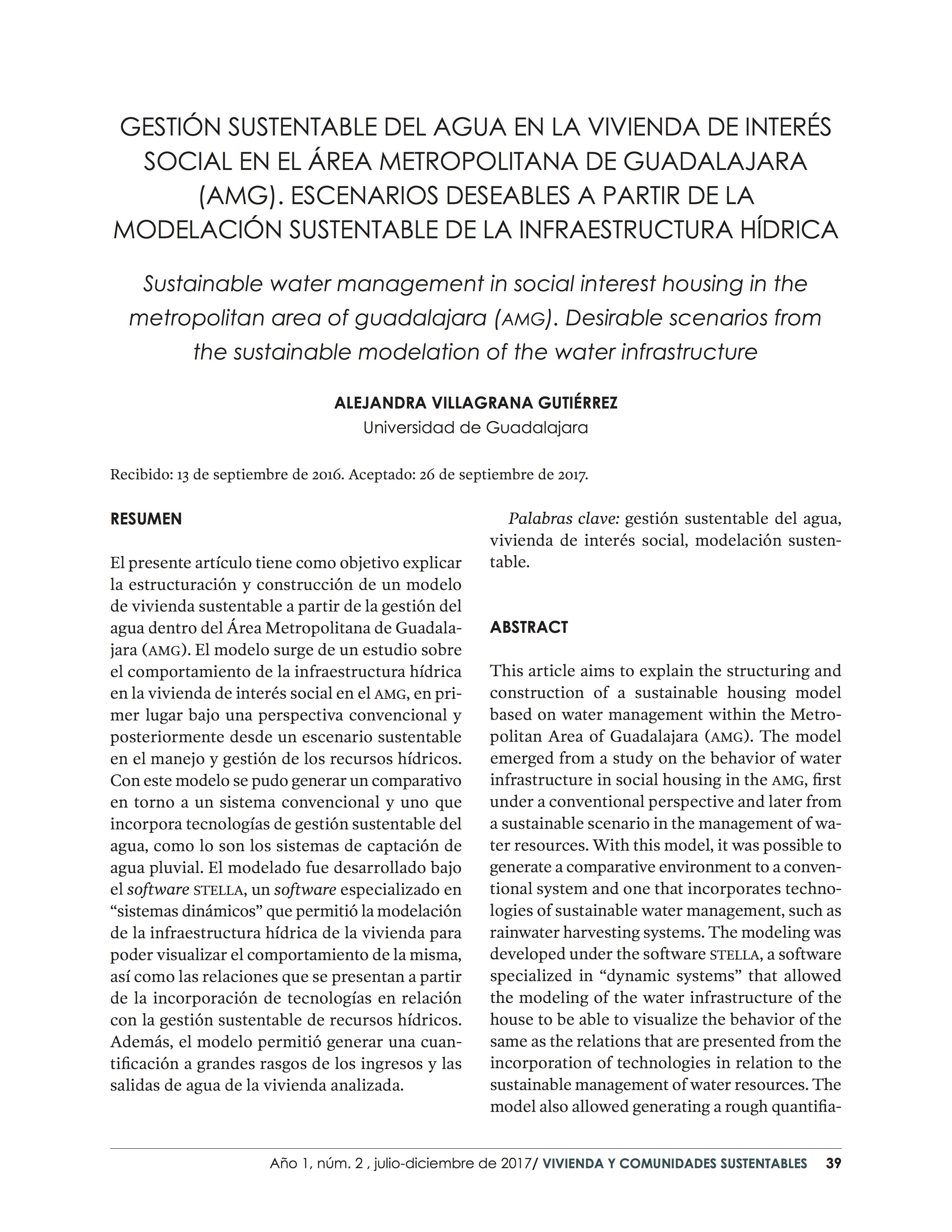Sustainable water management in social interest housing in the metropolitan area of guadalajara (AMG). Desirable scenarios from the sustainable modelation of the water infrastructure
DOI:
https://doi.org/10.32870/rvcs.v0i2.23Keywords:
Sustainable water management, social housing, sustainable modelingAbstract
This article aims to explain the structuring and construction of a sustainable housing model based on water management within the Metropolitan Area of Guadalajara (AMG). The model emerged from a study on the behavior of water infrastructure in social housing in the amg, first under a conventional perspective and later from a sustainable scenario in the management of water resources. With this model, it was possible to generate a comparative environment to a conventional system and one that incorporates technologies of sustainable water management, such as rainwater harvesting systems. The modeling was developed under the software stella, a software specialized in “dynamic systems” that allowed the modeling of the water infrastructure of the house to be able to visualize the behavior of the same as the relations that are presented from the incorporation of technologies in relation to the sustainable management of water resources. The model also allowed generating a rough quantification of the inputs and the outputs of water in the housing analyzed.Metrics
References
García, R. (2011). Interdisciplinariedad y sistemas com- plejos. Obtenido de http://contenidosabiertos. academica.mx/jspui/bitstream/987654321/504/1/ interdisciplinariedad_y_sistemas_complejos.pdf
Holland, J. H. (2011). El orden oculto: de cómo la adaptación crea la complejidad . México: Fondo de Cultura Económica.
Krier, L. (2011). The Architecture of Community. Washington: Island Press.Marsalek, J. (2007). Urban Water Cicle Processes and Interactions. Londres: UNESCO.
ONU-HABITAT. (15 de noviembre de 2016). Orga- nización de las Naciones Unidas. Obtenido de onu-habitat. Por un mejor futuro urbano. http://www.un.org/es/events/habitatday/pdfs/ onu-habitat_brochure.pdf
Pauleit, S. y Friedrich, D. (19 de julio de 2000). As- sessing the Environmental Performance of Land Cover Types for Urban Planning. Munich: Technische Universität Muënchen.
Rueda, S. Indicadores relacionados con el metabolismo urbano. Recuperado el 20 de septiembre de 2015, de sitio web del ayuntamiento de Sevilla: http://www.sevilla.org /urbanismo/plan_indicadores/4-Metabolismo%20urbano.pdf
SEMARTNAT (2013). Diario O cial de la Federación. Re- cuperado el 20 de septiembre de 2015. http:// www.dof.gob.mx/
SIAPA (2015). Los informes trimestrales y anuales de actividades del sujeto obligado. Recuperado el 18 de septiembre de 2015, de sitio web de siapa. http://www.siapa.gob.mx/transparencia/ los-informes-trimestrales-y-anuales-de-actividades-del-sujeto-obligado.

Downloads
Published
How to Cite
Issue
Section
License
Copyright (c) 2017 Vivienda y Comunidades Sustentables

This work is licensed under a Creative Commons Attribution-NonCommercial-NoDerivatives 4.0 International License.
The authors who publish in this journal accept the following conditions:
In accordance with the copyright legislation, Sustainable Housing and Communities recognizes and respects the moral right of the authors, as well as the ownership of the patrimonial right, which will be transferred to the University of Guadalajara for its dissemination in open access. Sustainable Housing and Communities does not charge authors for submitting and processing articles for publication. Authors may make other independent and additional contractual agreements for the non-exclusive distribution of the version of the article published in Sustainable Housing and Communities (for example, include it in an institutional repository or publish it in a book) as long as they clearly indicate that the work is published for the first time in Sustainable Housing and Communities.





